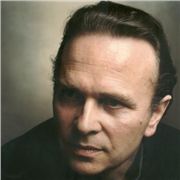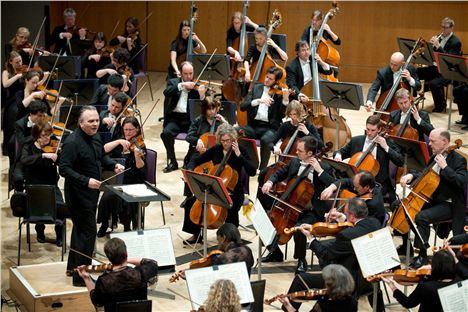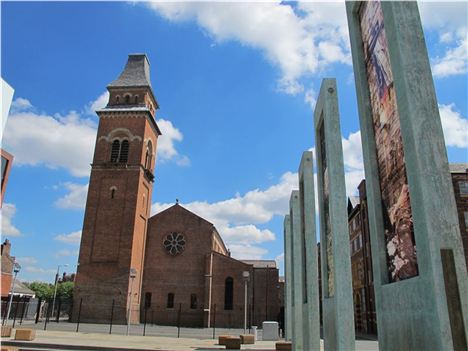IT TOOK a while to catch up with Sir Mark Elder, the Hallé’s Music Director, to congratulate him on his decision to commit his future to the Manchester orchestra till 2020 (first appointed in 2000 and now 66, he is also Principal Artist with the Orchestra of the Age of Enlightenment and has commitments to opera houses around the world).
"Manchester gave me this great opportunity and it has worked brilliantly. It’s a dream come true to look after my own orchestra in my own country for my own people."
Eventually I caught him at his Highgate, London home on the eve of his departure to New York for yet another global engagement...
Sir Mark, how much time do you spend at home?
I’m away so often, I don’t count the days any more. And home, of course, counts as Manchester, too. A great city.
Why did you renew your tenure till 2020?
I go all over the world to work with marvellous orchestras with distinctive pasts and expectations, yet still I miss the Hallé, what we have together; they know the way I work, they play so beautifully, they retain their curiosity, which is important, when we do some unexpected repertoire. I value that. You can take musical risks.
What plans have you for the Hallé?
 Sir Mark ElderThe big projects we discuss some way into the future and form the seasons around them.
Sir Mark ElderThe big projects we discuss some way into the future and form the seasons around them.
I have conducted two operas of Wagner’s Ring Cycle with the Hallé at the Bridgewater. It would be neglectful not to finish the Cycle, don’t you think? I hope we can do that.
Berlioz is important, too. Hallé was a great champion of the French composer and brought awareness of him into this country. There are big works by Berlioz we should be doing. Similarly Delius. Not all my orchestra might agree with me, but... Delius is only possible with a conductor and orchestra who find the secret together, make it special. It would be the beginning of something special, perhaps a Delius festival. I am in favour of creating festivals. They are special occasions, allowing audiences to see considered connections (this is happening with current Strauss’s Voice http://straussvoice.com collaboration between the Hallé, BBC Phil and Manchester Camerate).
For example, the Shostakovich cycle we did featured the composer’s 2nd and 3rd symphonies which have been unfairly dismissed. I was keen to do them to reveal their worth. I’d done the 2nd before but the 3rd was a breakthrough. Few people had listened to it in recent years; many many more did through us and appreciated it.
Sibelius I want to feature. He is another composer with great links with Manchester and he is important for me – his symphonies were the first I heard (growing up in Hexham, Northumberland, the son of a dentist). A Sibelius festival would be good, to hear lesser-known works.
 Sir Mark And The Hall (Photo Credit: Russell Hart)
Sir Mark And The Hall (Photo Credit: Russell Hart)
How strong is the Hallé’s commitment to contemporary composers?
I wish we could do more. We obviously have to take into account commercial imperatives, but we will continue to commission new works. Composing is at a great level in this country at the moment and we should reflect this. I am proud of the upcoming premiere of John Casken’s oboe concerto (April 10 with Stephane Rancourt as soloist).
You are very committed to musical education and are President of the Future Talent charity. Why is this so important?
What we do for education is important for the future of music. Two to three years ago, the Hallé’s director of education occupied a small back room – today Steve Pickett leads an amazing elaborate operation we see as vital. 75 percent of the orchestral members are involved in educational work, brimming with energy to bring music to children. It’s good to get the youngsters to come to the Bridgewater but it is important to go out to the schools – indeed to take out a whole symphony orchestra to explain to them how it works.
I am glad we seem to be attracting more students to see our concerts, though it’s hard to gauge what they are going to turn up for!
The Hallé recently appointed 20-year-old Jamie Phillips as your youngest-ever assistant conductor. That is sending out a message, surely?
Jamie is there on merit. He’s a role model, proof that with hard work you can achieve a lot. When I was young Sir Edward Downes offered great encouragement to me. I might not have succeeded as a conductor but for him.
Is the Hallé St Peter’s space on Blossom Street in Ancoats the key to the orchestra’s educational mission?
It is very important. A glorious space already being used by our youth choir, main choir and for auditions. We intend it to be the place where we will concentrate our musical studies. It is our dream over the next few years to extend it with a four storey extension alongside, where we can base all our admin. There may even be an office for the Maestro!
Funding remains an issue with cuts in grants in the next two years?
Financial security is not completely assured. But investment is not just about existing, it’s all about being able to maintain and improve levels of performance. We must be able to dream.
The innovative corporate choir competition was a valuable fund-raiser in all ways?
Certainly. It was a way of encouraging natural musicianship – without the need for expensive instruments. The choirs were sharing a terrific experience and we were raising money through it. In current circumstances, too, we are so indebted to the orchestra’s important sponsors – Siemens, PZ Cussons, Manchester Airport and all the rest. Our Head of Development Kath Russell does a remarkable job.
You must be proud of the continuing success of the Hallé’s own CD label, founded 10 years ago?
Yes, it has played a huge part in raising awareness of the orchestra, especially in showing London what we do. The artwork is unlike anyone else’s – very distinctive. We mix up the recorded repertoire and it always feels something fresh and excellent is happening. Yes, our prize for Elgar’s Gerontius (Gramophone Awards 2009) was a great landmark, but our recording of the same composer’s The Apostles has created a genuine stir, too. It wasn’t regarded as ‘important’, but people have been moved by it.
Despite your globetrotting you are obviously very happy to have forged this continuing bond with the Hallé?
Of course. Manchester gave me this great opportunity and it has worked brilliantly. It’s a dream come true to look after my own orchestra in my own country for my own people.
Sir Mark’s next concert conduction the Hallé at the Bridgewater Hall will be on Thursday, February 27 in a programme of Ravel’s Mother Goose, Beethoven Symphony No 7 and Richard Strauss’s Orchestral Songs, part of the Strauss’s Voice festival. For details of entire Hallé season visit www.halle.co.uk.














